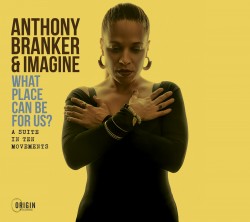MUSIC REVIEW BY Matt Collar, All Music Guide
Although he doesn't play any of the instruments on 2023's What Place Can Be for Us?, Anthony Branker's vibrant jazz sensibilities and identity as a first-generation Black American of Caribbean descent are at the core of the album's pulsing character. A longtime professor at Princeton and Rutgers, Branker started out playing trumpet, but health issues following two brain aneurysms in the late '90s forced him to refocus his attention on composing, arranging, and producing. Subsequently, he has produced a string of albums for the Origin label featuring many longtime musical associates who help bring his sophisticated brand of post-bop jazz to life. Here he is joined by a stellar ensemble featuring saxophonists Walter Smith III and Remy Le Boeuf, trumpeter Philip Dizack, guitarist Pete McCann, pianist Fabian Almazan, bassist Linda May Han Oh, and drummer Donald Edwards. A spiritual sequel to 2014's The Forward (Towards Equality) Suite, What Place Can Be for Us? finds Branker crafting a ten-piece suit in which he explores themes of cultural identity and erasure, xenophobia, and racism in American society stemming from its history of slavery. Having grown up with parents who immigrated from Trinidad and Barbados, Branker has a distinctive point of view on all of this. Literally lending her voice to this point of view is singer Alison Crockett, who also appeared on The Forward and who contributes spoken word segments woven into some of the musical arrangements. On the opening "The Door of No Return," her voice is framed against insistent piano, crunchy electric guitar, and supple horn lines; Crockett asks, "Where am I?/What hands are these that pulled us out of our land?/What language is this that hurts our souls?/The sound of the whip cuts the soul." This invocation of the inner thoughts of enslaved peoples (a text culled from Brazilian writer Beatriz Esmer's writings about Senegal's slave trade on Gorée Island) sets the tone for what is to come. Crockett also appears on "I, Too, Sing America," a dusky, modal-sounding piece based on Langston Hughes' 1926 poem "I, Too," in which Hughes' words about the yearning for equality are given a bold urgency by saxophonist Smith's Coltrane-esque tenor lines. From there, Branker offers a series of evocatively titled instrumentals like "Sundown Town," "Sunken Place," and "Sanctuary City," all of which further illuminate his emotionally layered and thoughtful jazz portrait of America.
Soundclips
Other Reviews of
"What Place Can Be for Us?":
All About Jazz (Italy) by Angelo Leonardi
Take Effect by Tom Haugen
Step Tempest by Richard Kamins
Textura by Ron Schepper
Jazzlands by Philip Booth
His Voice (Czech Republic) by Jan Hocek
DownBeat Magazine by Josef Woodard
Chicago Jazz Magazine by Jeff Cebulski
Nettavisen (Norway) by Thor Hammerø
All About Jazz by Michael Ambrosino
Paris Move by Thierry Docmac
